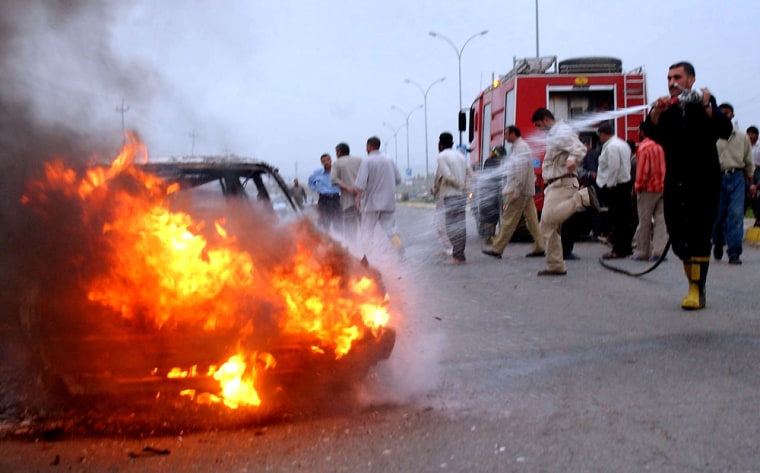Insurgent attacks in Iraq have fallen dramatically since the Jan. 30 elections, and the number of U.S. deaths reported this month dropped to the lowest in a year.
But the news isn’t all good. Militants are focusing their attacks on Iraqi government and security officials as the new leaders of Iraq assume a greater role in their fragile nation.
Both U.S. and Iraqi officials agree that attacks overall have fallen since the Jan. 30 elections, although it is unclear if the trend is just a temporary lull as militants change tactics, or a sign that the insurgency is weakening.
Michael O’Hanlon, a senior fellow at the Brookings Institution in Washington, which has been tracking the insurgency, said attacks against U.S. forces have dropped by at least 25 percent since last fall, when U.S. officials launched a major offensive against the insurgent stronghold of Fallujah. Attacks then ranged from 80 to 90 a day, O’Hanlon said.
However, attacks still haven’t fallen below the level of a year ago — between 10 to 20 a day, according to a Defense Department document dated July 2004.
U.S. defense officials say they were down to 40 to 45 a day in recent weeks, lower than the pre-election average of 50 to 60 a day.
Post-election drop-off
The change was apparent after the elections, with the number of U.S. soldiers killed dropping from 58 in February to 30 in March — the lowest monthly death toll since 20 American soldiers were killed in February 2004, according to an Associated Press count.
Air Force Lt. Gen. Lance Smith said U.S. forces could begin coming home in significant numbers if insurgent violence is low through general elections scheduled for the end of the year.
A larger and more capable insurgency, setbacks in the efforts to develop Iraq security forces, or missed deadlines by the transitional government could delay any significant drawdown, said Smith, the deputy commander of U.S. Central Command.
As reports of car bombings and ambushes noticeably dwindle, another trend has been seen as more Iraqi police and soldiers are put out on the street.
Attackers are targeting Iraqi officials seen as traitors for working with — and eventually replacing — the U.S.-led coalition, Army Capt. Salman Abdul Wahid said, adding that many attacks in March were against Iraqi forces.
Local forces ‘easy targets’
“The Iraqi army and police are easy targets for terrorists,” he said. “They lack the modern equipment of the Americans.”
There are also more of them on the streets every day. Ali al-Faisal, a member of the Shiite clergy-backed United Iraqi Alliance, a coalition of lawmakers leading the new parliament, said the change was because Iraqi police are taking the lead in fighting the insurgency.
“In the past, they were targeting the American forces because they were in charge of security,” he said. “After the new Iraqi army and police were established — and succeeded in maintaining security and began annihilating (the insurgents) — they shifted their attacks.”
Still, insurgents haven’t forgotten the Americans. On Saturday, two U.S. soldiers were killed and two others were wounded by a car bomb in Baghdad.
The developments are being closely watched, as U.S. and Iraqi officials try to determine when the U.S. government will withdraw from the country.
Fewer victims, official says
On Monday, interim Interior Minister Falah al-Naqib outlined progress by the growing number of security forces and said attacks were not only decreasing, but claiming fewer victims. He credited the growing role of Iraqi forces, saying it was easier for them to gather intelligence on insurgents than it was for U.S. troops.
Encouraged by the Jan. 30 elections and a state-run television station that broadcasts the confessions of alleged insurgents, Iraqis have also begun turning in information on suspicious activities or people, U.S. and Iraqi officials say.
O’Hanlon said the relative optimism has hurt insurgent recruitment and turned public opinion against the militants.
“There’s just more and more a sense that the insurgents are attacking Iraqis and Iraq itself,” he said.
If the insurgents continue to focus attacks on Iraqi officials, O’Hanlon said, the conflict “could become more of a civil war.”
Coalition forces out soon?
Al-Naqib said the situation has improved so much that some cities will see foreign troops pulling out soon.
“If the same pace of the last six or seven months continues, then God willing, during the coming 18 months we will be able to preserve security inside Iraq,” he said.
Lt. Col. Clifford Kent, a spokesman for the 3rd Infantry Division based in Baghdad, said soldiers are noticing an improvement on the streets, as “Iraqi police and security units are standing up and becoming more effective.”
“It’s uplifting,” he said.
Abdul Hamid al-Ghanami, a 35-year-old engineer in Baghdad, said he has felt safer. “I did feel like I was staring down death each time I left my house,” he said. “In terms of security, there is now a kind of comfortable feeling of victory, and we feel like terrorism has been isolated to far pockets, outside of the cities.”
